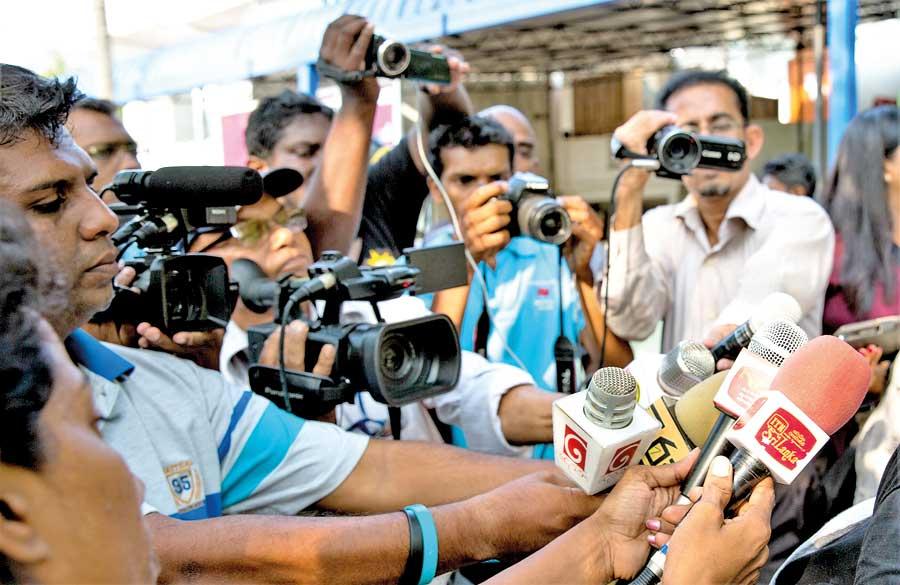29 Jun 2022 - {{hitsCtrl.values.hits}}

Despite growing challenges and suppressions, the duties of journalists have become increasingly challenging in Sri Lanka where political and economic turmoil continue to torment the island nation
The last column I wrote on why the media is increasingly in the firing line of public anger elicited some interesting responses.
responses.
A few wrote me to reinforce the sentiments that this was a long time coming. That the media should have been expecting this given years and years of partisan coverage. It is hard to argue with this.
Others told me that not all media is treated this way and that at least there is a minority that still enjoys public respect. Though that number appears to be dwindling. A few lumped me in the lot of partisan journalists who preach and not practice.
One thing was clear, there is very little by way of sympathy for the Sri Lanka media or journalists. For generations we in the media have thought of ourselves as custodians of the right to inform. The Sri Lanka media has also paid a dear price for this.
"The once apex position that journalists enjoyed at the top of the information dissemination hierarchy is no longer valid. Nor should it be. It was this position that many journalists abused for political and personal gain."
But the very public that we feel will benefit from the right to inform is rebelling against us, treating us like parasites. They think that the media is part and parcel of the problem. In the court of public opinion, any good the media has done is outweighed by the evils it has perpetrated.
All those years of spinning stories have had their impact. That impact is what all my colleagues now face on the ground. The despair they convey to me when they say that their jobs are not secure, pay is abysmal and that neither their employers nor their community care about their safety.
That employers really did not care too much for the safety of the journalists is nothing new. What should be a more pressing concern is the level of ignorance and indifference showed by the collective of media development organisations.
There are a dozen or more national, international and hybrid media development organisations that are working in Sri Lanka. By and large they have failed to react positively to the trying reporting circumstances facing the national journalism community.
Releasing statements has been the beginning and the end of the action. There have been no efforts to build safety related skills woefully lacking among the national journalists. No effort has been made to raise awareness nationally as well as internationally on the threats faced by the media.
There has been no lack of tough talk though, especially on social media by the self-anointed media experts, most of whose expertise has been limited to being talking heads. Given the circumstances, no wonder most of the journalists who have been reporting on the protests feel that they have been forsaken by their own community and now hunted down by others.
#GotaGoHome protests have been watershed moments for this nation’s history in so many ways. The political culture has changed in ways we thought impossible. Demi-gods have not only been ex-communicated but generations they invested into plunder the nation further have been thrown into the dustbins.
"One thing was clear, there is very little by way of sympathy for the Sri Lanka media or journalists. For generations we in the media have thought of ourselves as custodians of the right to inform. The Sri Lanka media has also paid a dear price for this"
The protests should be a similar harbinger for change in the Sri Lanka media. May be not so for the myopic owners and some managers, but at the very least for the way journalists work. The protests clearly emphasised the blurring distinctions between off-line and on-line journalism. It is now interconnected. As is the case for citizen journalists and the traditional journalists.
The once apex position that journalists enjoyed at the top of the information dissemination hierarchy is no longer valid. Nor should it be. It was this position that many journalists abused for political and personal gain.
Thankfully there is a new generation of journalists who actively seek to professionalise their trade. What they lack are the resources to do so in country.
What all these organisations should do right now is to assess the needs of Sri Lankan journalism community and look for ways to meet those demands, not pontificate endlessly.
The writer is a journalism researcher and a writer. He can be contacted on [email protected]
27 Nov 2024 18 minute ago
27 Nov 2024 28 minute ago
27 Nov 2024 32 minute ago
27 Nov 2024 50 minute ago
27 Nov 2024 2 hours ago